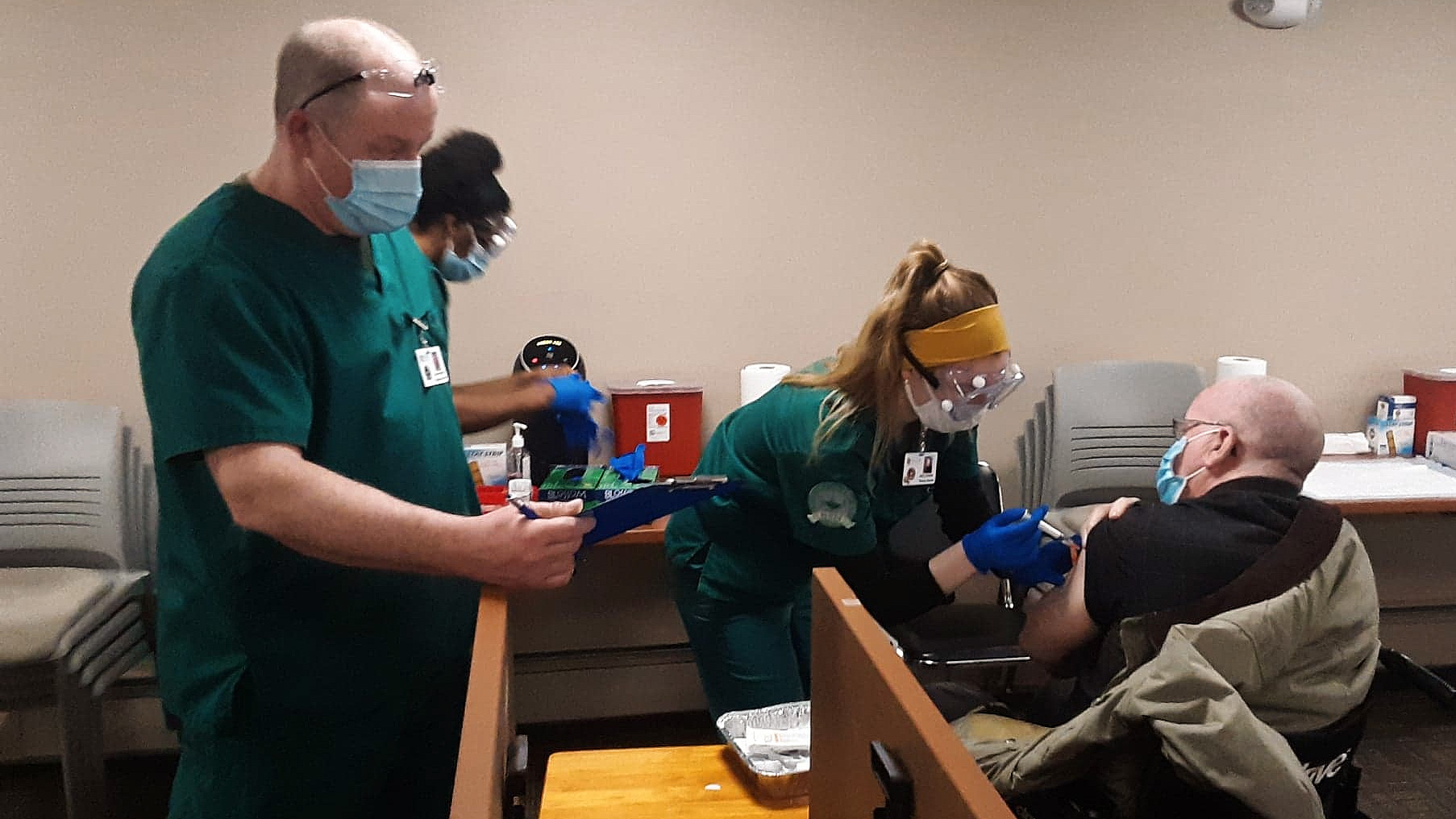
PRESQUE ISLE, Maine — As the national public health emergency for COVID-19 nears its May 11 end, the levels of the virus in Aroostook County have flipped from low to moderate in recent weeks.
Even though the virus is in a less severe state, the population still doesn’t have herd immunity because fewer people are receiving the latest COVID-19 booster.
Northern and eastern Maine — Aroostook, Piscataquis, Penobscot, Hancock and Washington counties — are ranked at moderate community transmission rates, while the rest of Maine is ranked low, according to the Maine Center for Disease Control and Prevention.
“If you look at that community transmission once every few weeks, it’ll kind of shift around and that’s because of the mathematical way it’s calculated,” said Dr. Herb Cushing, infection control consultant for Northern Light Mercy Hospital.
Cushing pays attention to the number of daily new cases reported and the numbers of hospitalizations in the state to get a sense of how the virus is circulating.
For people who have not had the virus, but have been vaccinated, antibodies from the vaccine decrease slowly over six months to a year and a half, depending on the person, he said.
“If we don’t get our latest [vaccine] boosters, people’s immunity to the virus goes down over time, and the longer you go without getting either reinfected or getting that booster, the chances that you’re going to get infected again go up,” Cushing said.
Maine’s case numbers steadily decreased from January through March, according to the Maine Center for Disease Control. Data as of March 29 showed Maine had a cumulative total of 320,678 COVID-19 cases, with 2,972 deaths and 7,276 hospitalizations. Aroostook County showed 18,515 total cases, with 204 deaths and 417 hospitalizations.
About 72 percent of Aroostook County residents have received the primary two-vaccine series, and 20 percent have received the latest of four boosters, according to the Governor’s Office on COVID-19 Response. Overall, 76 percent of Mainers are vaccinated.
There are many treatment options available for the current strain of COVID-19 called XBB.1.5, according to Dr. James Jarvis, Director of Clinical Education at Northern Light Eastern Maine Medical Center and senior physician executive of system incident command at Northern Light Health.
COVID-19 hospitalizations are lower this year compared to last year, and are steady across the Maine medical system with around 30 to 50 patients hospitalized for COVID symptoms, Jarvis said.
After the pandemic state of emergency ends, the federal government will leave it to the state and local levels to handle COVID-19, he said.
To that end, Maine is developing a coalition of healthcare providers from around the state who will share more resources concerning future COVID infections and examine possible causes of long COVID, Jarvis said.
As the pandemic becomes more endemic, or constantly present, it could be more like a seasonal flu potentially occurring in the winter to spring months, according to Julie Tutt, infection prevention manager at Northern Light A.R. Gould Hospital in Presque Isle.
“These newer variants that are more transmissible cause much less severe disease, and even in some of the hospitalizations that we do see, COVID may not be that primary diagnosis. It may be an incidental finding,” Tutt said.
In Aroostook County, less severe COVID variants like omicron are contributing less to severe disease and a decrease in the mortality rate, Tutt said. The COVID-19 medication paxlovid has resulted in fewer hospitalizations.
As far as masks go, people need to decide for themselves whether to mask in large, crowded spaces spending on their risk factors and comorbidities, Tutt said.
Both Cary Medical Center in Caribou and Houlton Regional Hospital reported more cases of flu than COVID-19.
There haven’t been as many COVID-19 infections this year at Houlton Regional Hospital, said Cheryl Quint, supervisor for employee health of the Infection Prevention Department.
There were more influenza infections starting in October before tapering off last month, Quint said.
Cary Medical Center in Caribou had briefly filled up beds with recent COVID infections but that was slowing down as of the end of February and leading into March, according to Mary Allen, infection preventionist at Cary.
“We are seeing an uptick in cases for the last two to three weeks in February,” said Mary Allen, infection preventionist at Cary Medical Center. “Around October and early November of 2022, there were more infections of influenza but that infection rate has slowed down for the last two months.”
Community transmission level is at a high rate for a hospital like Cary Medical and hasn’t changed much, she said.
The latest booster came out in fall 2022 to fight the new variants of COVID-19. Those variants, including the XBB.1.5, account for 97.3 percent of COVID-19 cases in Maine, Allen said.
Representatives from Northern Maine Medical Center in Fort Kent did not respond to requests for comment.






